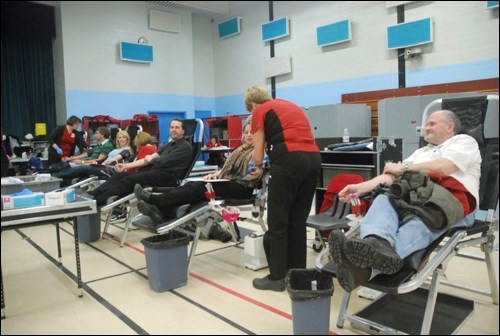The first time, I simply followed the signs saying "free cookies."
There were cookies alright, but the Canadian Blood Services should really look up free in the dictionary. Free does not mean "in exchange for your blood."
However, once the trauma of the needle and watching my life force seep away into a plastic bag was behind me and I was seated at a table overflowing with all the 'free' juice, pop, granola bars and cookies I could eat, I began to understand why donating blood was a good thing.
Besides the cookies, there are other minor reasons people should donate blood, such as oh, I don't know saving someone's life, perhaps.
When I saw there was going to be a blood clinic at the Don Ross Centre Mar. 2, I joined the steady stream of people heading to give blood.
I was amazed at how fast everything went at the Don Ross. I didn't have to wait long for anything; no sooner than they had taken my name, I was having my finger pricked to check for iron levels.
After filling out the top half of the questionnaire, which asked such things as whether I was taking medication, feeling unwell, recently travelled or pierced myself, Sharlene, one of the nurses, took me into a little booth to ask me the remaining questions.
I've always felt as though I'm in an interrogation room for this part of the donor process. I have to resist the urge to act suspicious.
"Have you injected illegal drugs in the past 12 months?"
"Define illegal," is something I've always wanted to say, just to get the nurse worried.
"Have you had sex with a man who has had sex with another man since 1977?"
"Well, I can't remember the exact year, but"
In reality, I just answer no to all the questions. Some might say it's a good thing, but I lead a fairly risk-free life. Except for that one time in college. (I'm joking or am I?)
After passing the interrogation, I didn't wait long before an empty spot became available.
For some reason, I cannot bring myself to watch the needle going in. I keep telling myself that it won't hurt any more if I see it (it really doesn't hurt at all - stubbing your toe hurts way more), but I always turn my head at the last second.
Then I spend the next 15 to 20 minutes wondering why I've forgotten to bring a book or a magazine, and then it's all over.
Off to the cookie table.
I love the way the nurses tell you to stay there until you don't feel faint. I've never felt faint, but I pretend I do until I can't possibly stuff another cookie in my face.
I always enjoy talking to other blood donors. Well, I enjoy listening to other blood donors - talking interrupts my cookie munching.
This time, I met Roger and Helmay, two people whose donor record puts mine to shame, as they have both donated over 100 times.
Roger said a big reason he donates is because he once needed a blood transfusion. When he was a young boy, a bullet narrowly missed his heart on a hunting trip. Needless to say, he understands the importance of donating blood.
Helmay has donated both her blood and her time as a volunteer. I was about to open my third package of cookies when she looked at me and said I looked familiar.
When I told her I worked for the paper, it was all over.
"Oh, you're the one doing that fitness challenge, aren't you?"
I put my cookie down.
"Yep, that's me."
When I go to give blood at the next clinic, May 4, I'll be wearing a disguise.
SIDEBAR
Donating blood is simple and, from when you walk through the doors to when you leave, takes only an hour.
The Canadian Blood Services desperately needs donors. From organ transplants to cancer treatments, someone in Canada needs blood approximately every minute.
About 450ml of blood is taken during a donation, which amounts to, depending on your weight, approximately one 10th of your total blood supply. Your body will replace the plasma portion of the blood within hours, the platelet portion within days and the red blood cells in less than three months.
A person can donate blood every 56 days.
If you are looking for more ways to donate, visit www.bloodservices.ca, where you can also find information about the bone marrow registry.
The next clinic in the Battlefords will be May 4 at the Don Ross Centre. For more information, or to make an appointment, call 1-888-2-DONATE.




